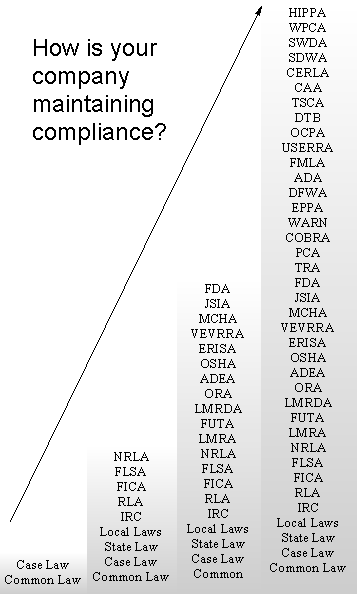Why Professional Employer Organizations - PEOs are in Demand
The Professional Employer Organization (PEO) industry’s primary market is businesses with 5-2500 employees. PEOs are in demand because:
- Business must comply with over 60 different employment-related governmental regulations. These obligations are beyond the ability to be done cost effectively by most mid-size businesses.
- Insurance providers charge small and midsized employers more for employee benefits than they charge larger employers. In addition insurance agents who are paid on commission are not interested in pursuing these smaller companies.
- Small and mid-sized businesses are substantially underserved by the insurance industry for workers’ compensation insurance. While required by law in all states (except Texas) many companies find that coverage is difficult to obtain and the cost of coverage to be exorbitant when available. PEOs provide work comp coverage and allow business to eliminate up-front fees and deposits. In addition PEOs provide guidance for improving workplace safety and managing workers’ compensation claims.
- Many State's Unemployment Insurance Funds are depleted to the point of insolvency or close to it. SUTA taxes are almost sure to rise from 2011 and beyond for most small and mid-sized businesses. Professional Employer Organizations offer services that assist business owners minimize their Unemployment Insurance and State Unemployment Tax expenses.
- Small and mid-sized businesses are at a major disadvantage in competing for talented employees because they typically cannot afford the cost and complexities of obtaining and administering a comprehensive health insurance and employee benefits package. PEOs allow cost effective access to an array of employee benefits that may be otherwise difficult to obtain.
- Because a PEO offer relief from many of these business related challenges, thousands of companies across the USA are now using a PEO to help make their business more successful. If your company decides not to use a PEO, consider this.
How can a Professional Employer Organization help your business?
Thousands of business owners and managers have discovered the operational advantages of using a Professional Employer Organization to handle their Human Resources tasks. It is estimated that over 2 million workers are currently employed by a PEO. From software designers to construction workers, PEOs are helping all types of companies and employees. Studies show that companies who join a PEO rarely go back, they understand the value that a PEO provides.
Using a Professional Employer Organization Can Improve Your Business
Businesses Use A PEO To:
- Control Costs
- Focus on core competencies
- Ensure regulatory compliance
- Keep and attract employees with employee benefits
- Manage workers' compensation risks
- Improve workplace safety
- Reduce payroll and accounting costs
- Offer advanced Human Resources services including employee handbooks, company policies, etc.
Improve Your Workplace
Employees Will Benefit From:
- Accurate and timely payroll services
- Comprehensive employee benefits
- Professional assistance with employment related problems
- Improved worksite safety
- Improved employer/employee communications
- Professional orientation and employee handbooks
- Regulatory compliance and statutory protection
Engaging a PEO: Avoiding Regulatory Fines and Penalties
All businesses with employees are faced with potential fines and penalties if laws and regulations are not met. Many business owners and managers have minimized or eliminated these risks by working with a PEO.
The following are examples of penalties that could have been avoided by using a Professional Employer Organization.
Failure to provide Worker's Compensation Insurance (in all states where required).
- $1,000 minimum fine
- Immediate "stop work" order
- $100 per day fine per employee while the "stop work" order is in effect
- 2-3 years unpaid premium penalty
Wage and Hour (Fair Labor Standards Act-FLSA)
- 2 years back pay and double for overtime
Failure to remit FICA Withholding from Employees
- Fines not more than twice the gross gain
- Willful failure, guilty of a felony and upon conviction thereof be fined not more than $10,000 or imprisoned not more than five years or both, together with the costs of prosecution
OSHA
- $5,000-$7,000 fine for each violation
- $250,000-$500,000 fine and up to six months in prison for the death of an employee
COBRA (Consolidated Omnibus Budget Reconciliation Act)
- $100 fine per beneficiary per day for failure to comply with regulations
EEOC Discrimination
- $50,000 for companies with up to 100 employees
- $100,000 for companies with 101 to 200 employees
- $200,000 for companies with 201 to 500 employees
- $300,000 for companies with over 500 employees
Contractor / Employee Misclassification
- Liable for unpaid taxes of contractor. Fines Vary: Microsoft paid $96.8 million
Child Labor Laws
- $2,500 per violation
Engaging a PEO: Ensuring Regulatory Compliance
Government regulatory rules regarding employment have escalated throughout the years. Business owners and managers have shifted the regulatory compliance risk by working with a PEO.



